
Infectious Disease Reports
Scope & Guideline
Leading the charge in infectious disease research and collaboration.
Introduction
Aims and Scopes
- Clinical Management of Infectious Diseases:
The journal focuses on the diagnosis, treatment, and management of various infectious diseases, providing insights into clinical practices and therapeutic advancements. - Emerging Infections and Pathogens:
There is a strong emphasis on emerging infectious diseases, including novel pathogens and the implications for public health, highlighting the need for timely research and response strategies. - Antimicrobial Stewardship and Resistance:
A core area of focus is on antimicrobial resistance, exploring stewardship strategies and the development of new therapeutic agents to combat resistant infections. - Pediatric Infectious Diseases:
The journal frequently addresses issues specific to pediatric populations, including unique challenges and management strategies for infectious diseases in children. - Global Health and Epidemiology:
Infectious Disease Reports examines global health perspectives, including the epidemiology of infections in various populations and the impact of social determinants on health outcomes. - Infection Prevention and Control:
The journal emphasizes infection prevention strategies, particularly in healthcare settings, to reduce the incidence of healthcare-associated infections.
Trending and Emerging
- Impact of Climate Change on Infectious Diseases:
Recent publications indicate a growing interest in the relationship between climate change and infectious diseases, highlighting how environmental factors influence disease emergence and spread. - Innovations in Antimicrobial Therapy:
There is an increasing focus on novel therapeutic approaches and the development of new antimicrobial agents, particularly in light of rising antimicrobial resistance. - Telemedicine and Digital Health Solutions:
The integration of telemedicine and digital health technologies in the management of infectious diseases is gaining attention, particularly post-COVID-19, as healthcare adapts to new paradigms. - Mental Health Impacts of Infectious Diseases:
Emerging research is beginning to address the mental health impacts of infectious diseases, particularly in the context of the COVID-19 pandemic and its aftermath. - Global Health Equity and Infectious Disease Research:
There is a noticeable trend towards discussing health equity in infectious disease research, focusing on disparities in healthcare access and outcomes across different populations.
Declining or Waning
- Traditional Diagnostic Methods:
There seems to be a decreasing focus on traditional diagnostic methods for infectious diseases, as newer molecular techniques and rapid assays gain traction. - Hospital-Acquired Infections:
Research specifically dedicated to hospital-acquired infections has become less prominent, possibly due to the increasing integration of infection control practices in clinical guidelines. - Historical Perspectives on Infectious Diseases:
Studies that delve into historical perspectives or case studies of infectious diseases are appearing less frequently, indicating a shift towards contemporary issues and new challenges.
Similar Journals
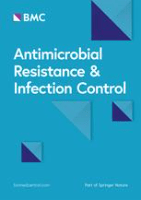
Antimicrobial Resistance and Infection Control
Advancing the fight against antimicrobial resistance.Antimicrobial Resistance and Infection Control is a leading open access journal published by BMC, dedicated to the dissemination of research in the critical area of antimicrobial resistance and its impact on infection control practices. Since its inception in 2012, the journal has quickly established itself as a vital resource for researchers, healthcare professionals, and policymakers, featuring a robust array of studies that address the escalating threats posed by antimicrobial resistance across various contexts. With its impressive Q1 rankings across multiple categories—including Infectious Diseases, Microbiology, Pharmacology, and Public Health—the journal’s influence is underscored by its consistent placement in the upper echelons of academic research. Furthermore, it holds commendable ranks in Scopus, with percentiles placing it in the top tier of its respective fields. The journal serves as an essential platform for innovative research and discussions aimed at curbing the threats of antimicrobial resistance, thereby supporting the global health community in striving for effective solutions to safeguard public health.

Current Infectious Disease Reports
Pioneering Insights for a Healthier TomorrowCurrent Infectious Disease Reports, published by SPRINGER, is a leading journal dedicated to advancing knowledge in the field of infectious diseases. With an ISSN of 1523-3847 and an E-ISSN of 1534-3146, this peer-reviewed journal has established itself as a vital resource for researchers and healthcare professionals since its inception in 1999. The journal's impact in the academic community is underscored by its Q1 ranking in Infectious Diseases for 2023, placing it in the top quartile of influential journals in the field. Furthermore, it holds a respectable position at rank #95 out of 344 in the Scopus database, reflecting its substantial contribution to medicine and public health. While currently not an open access journal, it offers a wealth of articles covering the latest research, case studies, and reviews, making it an indispensable tool for those aiming to stay at the forefront of infectious disease science. As we navigate an era marked by emerging and re-emerging infectious threats, Current Infectious Disease Reports remains committed to providing high-quality, relevant research that supports evidence-based practice and informs future studies globally.

INFECTION CONTROL AND HOSPITAL EPIDEMIOLOGY
Elevating Standards in Epidemiology and Infection ControlINFECTION CONTROL AND HOSPITAL EPIDEMIOLOGY, published by Cambridge University Press, is a leading academic journal specializing in the critical fields of epidemiology, infectious diseases, and medical microbiology. With a history of publication dating back to 1988 and an expected continuation through 2024, the journal has established itself as a pivotal resource for researchers, healthcare professionals, and students alike. The journal's impact is reflected in its impressive rankings, positioning it in the second quartile for Epidemiology and the first quartile for both Infectious Diseases and Medical Microbiology as of 2023. This esteemed journal is dedicated to the dissemination of high-quality research that informs best practices in infection control and enhances patient safety across healthcare settings. Although access to its content is not open, the rigorous peer-review process ensures that all published articles contribute significantly to the body of knowledge in these vital areas. With a commitment to bridging the gap between research and practice, INFECTION CONTROL AND HOSPITAL EPIDEMIOLOGY remains an essential publication for those committed to the advancement of public health and the science of infection prevention.
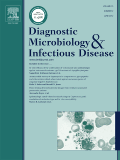
DIAGNOSTIC MICROBIOLOGY AND INFECTIOUS DISEASE
Pioneering Insights for Health ChallengesDIAGNOSTIC MICROBIOLOGY AND INFECTIOUS DISEASE, published by Elsevier Science Inc, is a leading journal in the fields of Infectious Diseases, Microbiology, and Medicine. Since its inception in 1983, this esteemed journal has consistently provided a platform for original research and comprehensive reviews that advance the understanding of diagnostic microbiology and its implications for infectious diseases. With an impressive impact factor placing it in the Q2 category in multiple relevant fields as of 2023, it stands out with Scopus rankings reinforcing its significance in academia, ranking #136 out of 344 in Infectious Diseases and #64 out of 140 in Medical Microbiology. This journal is essential for researchers, healthcare professionals, and students who seek to stay abreast of the latest developments and trends in infectious diagnostics. DIAGNOSTIC MICROBIOLOGY AND INFECTIOUS DISEASE is committed to fostering excellence in research quality and academic rigor, ensuring accessibility to vital knowledge for addressing some of the most pressing health challenges of our time.
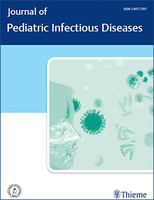
Journal of Pediatric Infectious Diseases
Advancing pediatric health through innovative research.Journal of Pediatric Infectious Diseases, published by GEORG THIEME VERLAG KG, serves as a vital platform for the dissemination of cutting-edge research in the fields of pediatric infectious diseases and related areas. With an ISSN of 1305-7707 and an E-ISSN of 1305-7693, this journal endeavors to address critical issues and innovations in pediatric medicine, fostering an understanding of infectious diseases that affect children. The journal is indexed in Scopus, where it holds a Q4 ranking in both Infectious Diseases and Pediatrics, Perinatology and Child Health, reflecting its emerging status within medical research. Although currently not open access, it offers valuable insights and empirical research crucial for healthcare professionals, researchers, and students dedicated to improving pediatric care. The Journal of Pediatric Infectious Diseases not only highlights contemporary challenges faced by pediatric health practitioners but also aims to be a cornerstone for future developments in the management and prevention of infections in young populations.

Klimik Journal
Elevating Standards in Infectious Disease Research.Klimik Journal is a pivotal publication in the fields of Infectious Diseases and Medical Microbiology, serving as a platform for researchers, clinicians, and academics to disseminate groundbreaking findings and improve health outcomes. Established in 2010 and published by DOC DESIGN INFORMATICS CO LTD, this journal is dedicated to advancing knowledge and fostering discussions around critical issues in infectious diseases and microbial research. With an ISSN of 1301-143X and an E-ISSN of 1309-1484, Klimik Journal strives to maintain high academic standards despite currently ranking in the fourth quartile in both categories according to Scopus metrics, which highlights the need for continued contributions to the field. Operating from Turkey, the journal is committed to supporting open access options, thereby ensuring wide dissemination of research findings. As it continues to bridge the gap between theory and practice, Klimik Journal is poised to become an essential resource for those looking to stay at the forefront of infectious disease research and microbiological advancements.
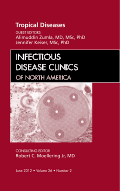
INFECTIOUS DISEASE CLINICS OF NORTH AMERICA
Uncovering Innovations in Infectious Disease ManagementINFECTIOUS DISEASE CLINICS OF NORTH AMERICA, published by W B SAUNDERS CO-ELSEVIER INC, stands as a premier academic resource in the field of infectious diseases and microbiology. With its ISSN 0891-5520 and E-ISSN 1557-9824, this esteemed journal has been at the forefront of disseminating critical research findings and clinical advancements since its inception in 1987. Known for its high impact, the journal ranks in the Q1 category for both Infectious Diseases and Medical Microbiology as of 2023, which underscores its significant contribution to advancing knowledge and practice in these vital areas. Researchers, practitioners, and students alike rely on its comprehensive yet concise reviews and original articles, ensuring they stay abreast of emerging trends and therapeutics in infectious disease management. Although it does not offer open access, the journal remains pivotal in enriching scholarly dialogue and influencing clinical practices in the United States and beyond. Explore this vital publication and join a community dedicated to excellence in infectious disease research.
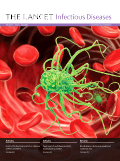
LANCET INFECTIOUS DISEASES
Bridging Research and Practice in Infectious DiseasesLANCET INFECTIOUS DISEASES is a premier journal published by Elsevier Science Ltd, dedicated to disseminating high-quality research and comprehensive reviews in the field of infectious diseases. Since its inception in 2001, the journal has become a pivotal resource in the medical community, recognized for its rigorous peer-review process and impactful contributions to public health. With an impressive Scopus rank of #2 out of 344 in the category of Medicine - Infectious Diseases, it consistently ranks in the 99th percentile, highlighting its importance and influence in shaping clinical and epidemiological research. The journal's commitment to advancing knowledge in infectious diseases is underscored by its Q1 quartile designation in 2023, affirming its status as a leading academic outlet. Although not an open-access journal, LANCET INFECTIOUS DISEASES provides essential insights for researchers, healthcare professionals, and students, bridging the gap between cutting-edge research and practical application in an increasingly interconnected world.
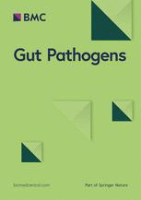
Gut Pathogens
Navigating the Complexities of Gut Pathogens for a Healthier FutureGut Pathogens, published by BMC in the United Kingdom, is a premier open-access journal focusing on the intersection of gut health and infectious diseases. With its impact firmly established since its inception in 2009, the journal has earned impressive rankings, including Q1 in renowned categories such as Gastroenterology, Infectious Diseases, Microbiology, and Parasitology, while maintaining a strong presence in Virology. The journal serves as a vital resource for researchers, professionals, and students interested in the intricate relationships between gut microbiota and pathogenic organisms, offering insights that drive advancements in treatment and prevention strategies. By providing unrestricted access to high-quality research, Gut Pathogens fosters a collaborative environment, encouraging the dissemination of knowledge and innovation within the field. The journal publishes original research, reviews, and case studies, all designed to address contemporary challenges in gut health, ultimately aiming to improve patient outcomes and public health worldwide.

CLINICAL MICROBIOLOGY AND INFECTION
Leading the Charge Against InfectionsCLINICAL MICROBIOLOGY AND INFECTION is a leading journal published by Elsevier Science Ltd, dedicated to advancing the field of infectious diseases and clinical microbiology. With its ISSN 1198-743X and E-ISSN 1469-0691, this esteemed journal has maintained its influential presence since 1995, showcasing high-impact research that addresses critical issues in the diagnosis, treatment, and prevention of infections. Ranked in the Q1 quartile for Infectious Diseases, Medicine (miscellaneous), and Microbiology (medical) categories, and boasting impressive Scopus rankings of #12 and #7 respectively, it sits at the forefront of scientific inquiry in these disciplines. Although it is not an Open Access journal, it provides comprehensive access options for institutions and individuals, ensuring the dissemination of vital research findings. As the field of clinical microbiology continues to evolve, CLINICAL MICROBIOLOGY AND INFECTION remains an essential resource for researchers, clinicians, and students aiming to stay informed on the latest developments and breakthroughs in understanding infectious diseases.